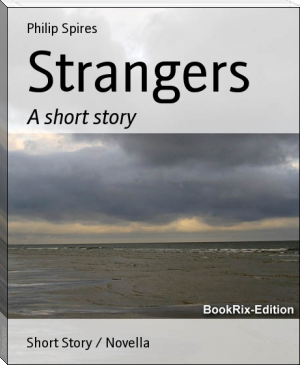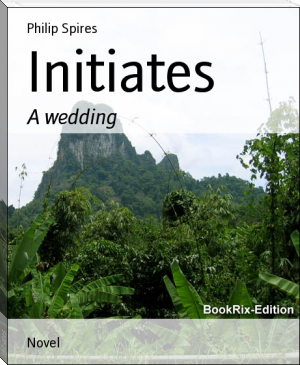Protesters by Philip Spires (cool books to read .TXT) 📕

- Author: Philip Spires
Book online «Protesters by Philip Spires (cool books to read .TXT) 📕». Author Philip Spires
before he dare speak them. The young leader thought that this might be the pose that the nation would choose to immortalise the man in bronze after his death. “Your revolution is a privileged state…”
“We are threatened from every side…”
The old man turned away, held up the palm of his right hand to stay the other’s words. “It’s privileged because you know where you stand. And that’s a luxury. You will be defeated, of course, but only temporarily. Your cause will triumph in the long term…”
“…when we are all dead…”
“Indeed. But your cause has integrity. It will be resurrected, maybe many times, and each time it will forge progress towards its goal. In Britain, we still continue to stuff ourselves with the illusion that our total defeat in the war was, in fact, a victory. The fact that we were not invaded convinces people that we won. We were on the winning side, but we lost the war. Ask them why the true victor demanded the complete dismantling of the British Empire, the ceding of our oil-rich territories in the Middle East, the adoption of an independent nuclear deterrent that we never had the right to use, and the requirement that we always send troops, always under the empire command, to any conflict that the empire chooses to pursue, and they will look at you blank-faced in ignorance. Our cause, our patriotism you might say, is corrupt. It’s a false consciousness, as false as people’s conviction that their consumer choices really exist. So when I worked for the services, we did the empire’s job. We had no choice. We knew who our real master was, and we knew we worked to further that interest, which had subsumed anything that we might call our own. Patriotism was not even on the agenda, because we could no longer identify what it was. So we did what we were told.”
“Plus a little more, on occasions.” It was a lawyer’s insistence, coupled with the politician’s opportunism that rendered this statement a question that demanded immediate response.
“I was not born rich,” said the old man, now leaning forward a tad more, his stoop an assertion. “Like any other human being I took a job. It paid the rent. A steelworker doesn’t necessarily believe in the ingot he is forging. A miner does not dig ideologically to supply the furnaces of capitalism.”
“But a man does not join an intelligence service devoted to fighting communism in order to dig coal.”
“It paid the rent. And I did other things on the side – for reasons of ….”
“Integrity? Truth? Conscience?”
“Lord, no! Pragmatism, as ever.”
The younger man held fire for a while. It was the right time to introduce the point, but the language was difficult to find. “So this would explain your current status. Patriotism, that which an outsider might presume you pursued when you worked for your government, was always a purely business arrangement. They paid you and you served them. And now they no longer pay you, so the patriotism evaporates and you become a tax exile. So you have no country apart from the self.”
“e e cummings, I believe?”
The younger man was silent, taken aback. A look of gentle confusion spread across his face. The tack he had planned had been undermined by this unexpected turn.
The older man sensed the other’s vulnerability and laughed. Intellect had once again granted an upper hand that was his to exploit, but he chose not to use his knowledge to control. “An American poet,” he said, calmly, “who broke all the rules, broke them so completely he recast what he did as a new system, a new set of rules. The artist’s only inevitable country is himself. You, Mr President, will never be an artist. You do not have the qualifications. For one, you have integrity, and lack the selfishness required.”
“So for you selfishness is publicly excused as pragmatism?”
“Each of us has a relationship to capitalism and pragmatism pays the rent. In your situation, where you are pushed outside of the ring, you don’t even have the choice to cooperate. For you, for your regime and for your people, pragmatism is not an option.”
“And was it pragmatism that led you to organize the infiltration of the student movements I later joined or the labour movement my friends organized? Was it your pragmatism that successfully placed spies in all the organizations that opposed the cynical old son of a bitch we called a dictator in our country but whom you and your imperial allies befriended because he was your son of a bitch? And is it not true that some of those people you placed, especially the less important ones in the student movement, did not they report to your office? And through that to our enemies? And was it pragmatism that led eventually to the arrest of activists, arrests that led to the imprisonment and exile of many truly honest and committed people? And was it also pragmatism that created the trumped up charges and rigged hearings that convicted them? And was it this pragmatism that led, in my own case, to years in jail and then exile – and eventually to my excommunication from a Church I love, that was my very life? Did you do that? Was all this the consequence of your pragmatism? Did you perpetrate such things to pay your rent?”
“I did what was required of me…”
“The defence of an officer in a death camp. I was acting under orders … … and doing a little on the side, making a small fortune from the market in gold teeth.” The young man’s scorn quickened the words to a tirade, the silence they demanded deep and uncomfortable. A politician who ought to have employed circumspection had lost control. A writer with a command of words had been cornered, rendered speechless and left without defence.
The president stood again at the window. He again retrieved the papers from his inside pocket and began to read. The old man, now looking every one of his eighty years, took the four steps needed to be at the other’s side. Over ignored papers and smouldering cigarette, their joint gaze again fell on the smartly dressed right wing thugs in the street below. “We know what we oppose,” said the president.
“At least today,” said the old writer.
There was a knock on the door, a sharp single perfunctory tap that signalled immediate entry. It was the old writer’s turn to speak to the assembled rally. Again, as he turned, he offered a back-turned left hand, a slight grasp of the other’s upper arm a gesture of solidarity. But this time the words were without passion, without animation and perhaps more sincere for their whisper. “No pasaran. I’m with you.”
“Today,” repeated the other quickly, the slight pause obviously inserted as a prelude to continuation, “and every day I have found your work inspirational.”
The old man smiled a little and gripped again.
Imprint
“We are threatened from every side…”
The old man turned away, held up the palm of his right hand to stay the other’s words. “It’s privileged because you know where you stand. And that’s a luxury. You will be defeated, of course, but only temporarily. Your cause will triumph in the long term…”
“…when we are all dead…”
“Indeed. But your cause has integrity. It will be resurrected, maybe many times, and each time it will forge progress towards its goal. In Britain, we still continue to stuff ourselves with the illusion that our total defeat in the war was, in fact, a victory. The fact that we were not invaded convinces people that we won. We were on the winning side, but we lost the war. Ask them why the true victor demanded the complete dismantling of the British Empire, the ceding of our oil-rich territories in the Middle East, the adoption of an independent nuclear deterrent that we never had the right to use, and the requirement that we always send troops, always under the empire command, to any conflict that the empire chooses to pursue, and they will look at you blank-faced in ignorance. Our cause, our patriotism you might say, is corrupt. It’s a false consciousness, as false as people’s conviction that their consumer choices really exist. So when I worked for the services, we did the empire’s job. We had no choice. We knew who our real master was, and we knew we worked to further that interest, which had subsumed anything that we might call our own. Patriotism was not even on the agenda, because we could no longer identify what it was. So we did what we were told.”
“Plus a little more, on occasions.” It was a lawyer’s insistence, coupled with the politician’s opportunism that rendered this statement a question that demanded immediate response.
“I was not born rich,” said the old man, now leaning forward a tad more, his stoop an assertion. “Like any other human being I took a job. It paid the rent. A steelworker doesn’t necessarily believe in the ingot he is forging. A miner does not dig ideologically to supply the furnaces of capitalism.”
“But a man does not join an intelligence service devoted to fighting communism in order to dig coal.”
“It paid the rent. And I did other things on the side – for reasons of ….”
“Integrity? Truth? Conscience?”
“Lord, no! Pragmatism, as ever.”
The younger man held fire for a while. It was the right time to introduce the point, but the language was difficult to find. “So this would explain your current status. Patriotism, that which an outsider might presume you pursued when you worked for your government, was always a purely business arrangement. They paid you and you served them. And now they no longer pay you, so the patriotism evaporates and you become a tax exile. So you have no country apart from the self.”
“e e cummings, I believe?”
The younger man was silent, taken aback. A look of gentle confusion spread across his face. The tack he had planned had been undermined by this unexpected turn.
The older man sensed the other’s vulnerability and laughed. Intellect had once again granted an upper hand that was his to exploit, but he chose not to use his knowledge to control. “An American poet,” he said, calmly, “who broke all the rules, broke them so completely he recast what he did as a new system, a new set of rules. The artist’s only inevitable country is himself. You, Mr President, will never be an artist. You do not have the qualifications. For one, you have integrity, and lack the selfishness required.”
“So for you selfishness is publicly excused as pragmatism?”
“Each of us has a relationship to capitalism and pragmatism pays the rent. In your situation, where you are pushed outside of the ring, you don’t even have the choice to cooperate. For you, for your regime and for your people, pragmatism is not an option.”
“And was it pragmatism that led you to organize the infiltration of the student movements I later joined or the labour movement my friends organized? Was it your pragmatism that successfully placed spies in all the organizations that opposed the cynical old son of a bitch we called a dictator in our country but whom you and your imperial allies befriended because he was your son of a bitch? And is it not true that some of those people you placed, especially the less important ones in the student movement, did not they report to your office? And through that to our enemies? And was it pragmatism that led eventually to the arrest of activists, arrests that led to the imprisonment and exile of many truly honest and committed people? And was it also pragmatism that created the trumped up charges and rigged hearings that convicted them? And was it this pragmatism that led, in my own case, to years in jail and then exile – and eventually to my excommunication from a Church I love, that was my very life? Did you do that? Was all this the consequence of your pragmatism? Did you perpetrate such things to pay your rent?”
“I did what was required of me…”
“The defence of an officer in a death camp. I was acting under orders … … and doing a little on the side, making a small fortune from the market in gold teeth.” The young man’s scorn quickened the words to a tirade, the silence they demanded deep and uncomfortable. A politician who ought to have employed circumspection had lost control. A writer with a command of words had been cornered, rendered speechless and left without defence.
The president stood again at the window. He again retrieved the papers from his inside pocket and began to read. The old man, now looking every one of his eighty years, took the four steps needed to be at the other’s side. Over ignored papers and smouldering cigarette, their joint gaze again fell on the smartly dressed right wing thugs in the street below. “We know what we oppose,” said the president.
“At least today,” said the old writer.
There was a knock on the door, a sharp single perfunctory tap that signalled immediate entry. It was the old writer’s turn to speak to the assembled rally. Again, as he turned, he offered a back-turned left hand, a slight grasp of the other’s upper arm a gesture of solidarity. But this time the words were without passion, without animation and perhaps more sincere for their whisper. “No pasaran. I’m with you.”
“Today,” repeated the other quickly, the slight pause obviously inserted as a prelude to continuation, “and every day I have found your work inspirational.”
The old man smiled a little and gripped again.
Imprint
Publication Date: 08-26-2008
All Rights Reserved
Free e-book «Protesters by Philip Spires (cool books to read .TXT) 📕» - read online now
Similar e-books:





Comments (0)